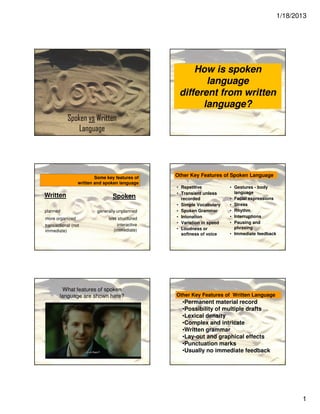
Spoken vs written epr
- 1. 1/18/2013 How is spoken language different from written language? Spoken vs Written Language Some key features of Other Key Features of Spoken Language written and spoken language • Repetitive • Gestures - body • Transient unless language Written Spoken recorded • Facial expressions • Simple Vocabulary • Stress planned generally unplanned • Spoken Grammar • Rhythm more organized less structured • Intonation • Interruptions • Variation in speed • Pausing and transactional (not interactive • Loudness or phrasing immediate) (immediate) softness of voice • Immediate feedback What features of spoken language are shown here? Other Key Features of Written Language •Permanent material record •Possibility of multiple drafts •Lexical density •Complex and intricate •Written grammar •Lay-out and graphical effects •Punctuation marks •Usually no immediate feedback 1
- 2. 1/18/2013 What features of written Some interesting facts... language are shown here? •Speech comes before writing historically. •Many languages lack a written form. •Many individuals cannot use written language. •Children automatically learn to speak, but have to be taught how to read. How is spoken Further Explorations: language Written & different from written Spoken Language language? Main Differences 1-Formality: Sounds Permanency Formality vs & & Letters Redundancy Function Which is usually more formal? Interaction Vocabulary between & Strategies listener/reader and Sentences speaker/writer 2
- 3. 1/18/2013 1-Formality Examples • because • got you Examples: • kuz • gotcha • "I don't wanna go to the party, • "I gotcha that candy bar you kuz it sounds boring." asked for." •A written note might say, • bet you • has to • betcha • hasta "Would you like to go out to lunch? “ • "I betcha can't eat ten hot • "He hasta know how much he dogs!" means to me." • The person who would write that note, • could have + consonant • have to • kuda • hafta might alternatively say, in person, • "I hafta clean the house before I go out." "You wanna go out for lunch? " 2- Spoken and Written Grammar • Some grammatical 3. On words and sentences constructions are only used in writing, as are some kinds of vocabulary, such as some Which require simpler words and complex chemical and legal terms. shorter sentences? • Some types of vocabulary are used only or mainly in speech. These include slang expressions, and tags like y'know, like, etc. 3. On words and sentences 4- Sounds and Letters • Spoken language uses words with fewer syllables than the written language. Written: • Written language tends to be more complex and intricate I want to go to the store than speech with longer sentences and many subordinate clauses. • However some forms of written language, such as instant Spoken : messages and email, are closer to spoken language. I wanna go to the store • Speech usually consists of idea units. 3
- 4. 1/18/2013 Sounds and Letters • Writers can make use of punctuation, headings, layout, colors and other graphical effects in their Finally .. redundancy written texts. Such things are not available in speech • Speech can use timing, tone, volume, and timbre to Which is more tolerant of add emotional context. redundancies and repetitions? Finally …redundancy Conclusion • Spoken language tends to be full of repetitions, incomplete sentences, Why is it important to know the difference corrections, and interruptions. between spoken and written language? • Some exceptions to these are formal speeches and other scripted forms of speech, such as news reports and scripts for plays and films. Why is it important to know the difference between spoken and written language? -To improve our communication skills by using appropriate forms and strategies -Examples -Using shorter sentences and simpler words when speaking. -Using appropriate pausing and intonation when speaking. -For writing? 4
- 5. 1/18/2013 Partial List of Sources or References • http://www.textator.lv/en/articles/internet-texts/instant- messaging/spoken-vs-written-language • http://www.differencebetween.net/language/difference-between-written- and-spoken-language/ • www.willis-elt.co.uk/documents/Fullhandout_000.doc • faculty.ksu.edu.sa/inaam/Stylistics/.../Spoken Spoken%20Vs%20Written Spoken Written.ppt Written 5